If you’re a chicken owner, you may have heard that papaya is good for chickens. But can chickens eat papaya safely? The answer to this question is yes! Not only is papaya safe for chickens, but it’s also packed with lots of essential nutrients and vitamins. Plus, chickens love the taste of this sweet tropical fruit.
Chickens can eat all parts of the papaya, including the skin and seeds. However, you should avoid feeding your chickens too much of the skin or seeds as they can cause digestive issues in some birds if consumed in large amounts. You should also never feed your chickens unripe or green papayas, as these can cause digestive problems. Ripe papayas are always best for consumption by both humans and animals alike!
This article will discuss the various health benefits of papaya for chickens and how to feed it to your flock safely.
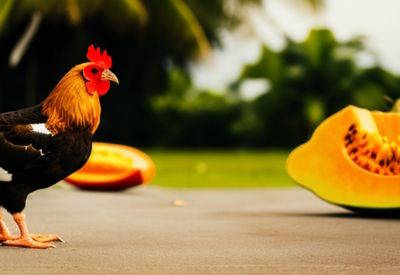
Can chickens eat papaya?
Papayas are an excellent source of vitamin C, which helps boost the immune system in chickens, making them less prone to illnesses such as respiratory infections and other health problems.
Papayas are also rich in other important vitamins and minerals such as magnesium, potassium, phosphorus, and calcium. All these nutrients help keep your chickens healthy by promoting strong bones and muscles and good digestion.
While there is no exact amount that can be given per day when feeding your chickens papaya, it’s important to remember that it should only be offered as an occasional treat – not a regular part of their diet.
Too much sugar from fruits like papayas can lead to obesity, affecting egg production in hens, so moderation is key here! A few slices once or twice a week should suffice – make sure it’s ripe first.
[ChickenAffiliate]
The benefits of eating papaya for chickens
Papaya is a nutritious and delicious fruit that can be enjoyed by humans and chickens alike. So if you’re looking to give your chickens a healthy treat, papaya is the way to go. Here are five great reasons to incorporate papaya into your chicken diet.
Vitamin-Rich
Papayas are rich in vitamins A, C, E, K, B6, and folate. These vitamins help your chickens build strong bones and feathers while keeping their immune systems healthy. In addition, the high content of antioxidants helps protect against cancer and other illnesses.
Digestive Health
Papayas contain an enzyme called papain which helps break down proteins for easier digestion for chickens. This means that your chickens will be able to absorb more nutrients from their food which helps them stay healthier for longer.
Boost Immune System
Papayas are packed with vitamin C, which helps boost the immune system of your chickens. This means that they will be better able to fight off any illnesses or infections that come their way.
Keeps Feathers Soft
Vitamin A in papaya helps keep feathers soft and vibrant while preventing them from becoming brittle or dry due to overbathing or sun exposure. It also helps keep skin healthy and supple by providing essential fatty acids and antioxidants that help prevent free radical damage caused by environmental pollutants or UV rays from the sun.
Healthy Snack
Not only do papayas provide all of these amazing health benefits for your chickens, but they also make a tasty snack that can be enjoyed on its own or mixed with other fruits like apples or bananas for a fun treat.
Things to watch out for when feeding papaya to chickens
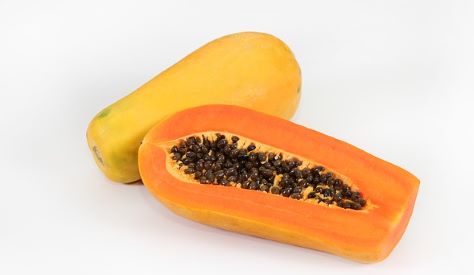
If you’re looking for a unique and nutritious treat to give your chickens, papaya could be the perfect option. But before you feed your feathered friends papaya, there are a few things you need to keep in mind. Read on for a quick guide to feeding papaya to your chickens.
Moderation is Key
Papaya has numerous health benefits for chickens. That said, it’s important to remember that too much of anything can be bad. Papaya should only be fed as an occasional treat; if given too often, it can cause digestive issues. The rule of thumb is that one or two small pieces per day should be plenty for each chicken.
Pick the Right Variety
Not all varieties of papaya are safe for chickens – in particular, unripe green papayas contain toxins that can make your hens ill. So, when picking out a papaya for your flock, always go for one ripe enough to eat yourself. This usually means picking out one with bright yellow skin and soft flesh.
Be Aware of Potential Allergies
As with any food, there is always a chance that your chickens may have an allergic reaction to papaya. So, if introducing new food to your flock, always be mindful of potential allergies and pay close attention to how they react. If they show signs of discomfort or irritation, stop feeding them papaya immediately and try another type of fruit instead.
How often should chickens eat papaya?
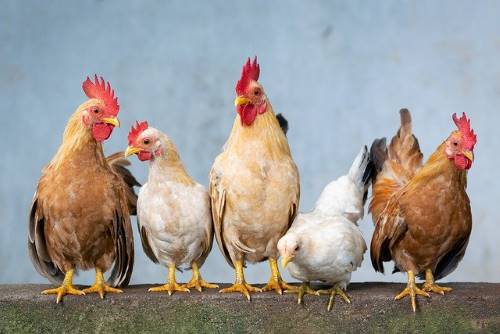
Feeding chickens papaya can be a great way to give them an occasional treat and vary their diet because papaya contains beneficial vitamins, minerals, and antioxidants. However, it shouldn’t make up more than 10% of their diet, as too much can have a laxative effect.
Papaya should only be part of their balanced diet – in moderation! However, offering the occasional papaya will give your chickens some tasty variety and essential vitamins that strengthen their immune system and help them maintain good health.
How to prepare papaya for feeding to chickens
Are you looking for a way to give your chickens a tasty treat? Papaya is a great option, as it’s full of essential vitamins and minerals that can help support your chickens’ health. Read on to learn more about how to feed papaya to chickens.
Wash First
Before feeding any food to your chickens, it’s important to ensure it is clean and free from dirt or debris. Start by washing the papaya with cool water before feeding it to your flock. This will ensure no bacteria or other contaminants enter your birds’ stomachs.
Whole or Sliced?
You don’t have to peel the papaya before feeding it – the skin is edible and nutritious. Depending on your chickens’ preference, you can feed the whole fruit or slice it into smaller pieces. If you slice the fruit, use a sharp knife and cut away any seeds as they are not very digestible for chickens.
Remove Uneaten Pieces After Feeding
If you feed pieces of papaya in an outdoor coop, check regularly and remove any leftovers that may attract pests like ants and rodents. It is also important not to leave wet fruits sitting around in warm weather as this could cause bacteria growth, leading to sickness in your flock.
Can baby chickens eat papaya?
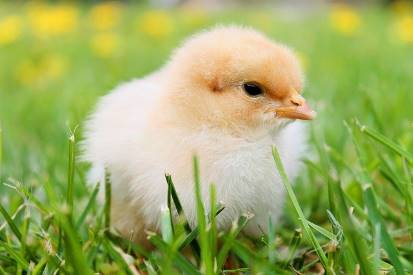
Can baby chickens eat papaya? The answer is yes. However, it is important to be mindful of papaya’s sugar content and keep it to a minimum when feeding them to your chicks. Furthermore, when feeding them papaya, removing both the seeds and peel is important, as they are too tough for their delicate digestive system.
It is important to remember that baby chickens can consume less fruit than adult chickens since digestion can take longer. If done correctly, papaya can make a great addition to your baby chick’s diet.
Can chickens eat papaya seeds?
Chickens can safely consume papaya seeds, which are rich in valuable nutrients such as fatty acids, essential amino acids, and antioxidants.
However, it should be noted that due to the composition of these papaya seeds, chickens may experience some digestive issues if provided in excess. Therefore, when offering this edible treat to your chickens, make sure you do so in moderation to ensure their health isn’t put at risk.
What other fruits can chickens eat?
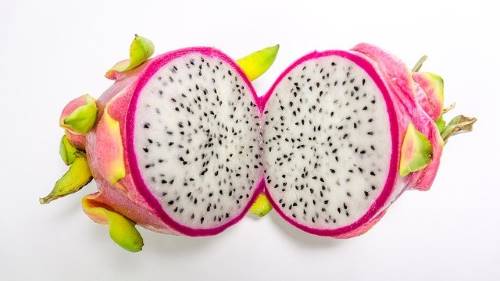
Do your chickens need a treat? If you’re looking for something special to give them, there are other options besides papaya. There are plenty of other delicious fruits that your chickens can enjoy. Let’s take a look at some of the best options!
Bananas
Bananas are an excellent source of vitamins and minerals for chickens, including potassium, magnesium, vitamin B6, and vitamin C. They also contain dietary fiber and natural sugars that can boost your flock’s energy. Be sure to peel the bananas before feeding them to your chickens, as their digestive systems can’t handle the skin.
Read More: Can Chickens Eat Bananas? 6 Awesome Benefits
Pineapple
Sweet and juicy pineapple is packed with nutrients such as vitamin C, manganese, copper, thiamin, and folate. It’s also rich in enzymes which help break down food in the chicken’s gut more easily. Like bananas, remove the skin before offering it to your birds.
Read More: Can Chickens Eat Pineapple? 5 Important Benefits
Dragon Fruit
Also known as pitaya or strawberry pear, dragon fruit is high in antioxidants, vitamins C and E, carotene, and minerals such as iron and phosphorus – all essential for healthy chicken development. You can feed both the white fleshy parts of the dragon fruit or if you have access to its cactus-like skin, then that too is edible for chickens.
Read More: Can Chickens Eat Dragon Fruit? 4 Awesome Benefits
Persimmons
Sweet persimmons are full of antioxidants that support overall health in chickens, and they make an excellent choice if you’re looking for a seasonal treat for your flock. Just be sure to remove any stems or leaves before feeding persimmons, as these parts can be toxic to birds when consumed in large quantities.
Read More: Can Chickens Eat Persimmons? 5 Amazing Benefits
Jackfruit
Jackfruit is an exotic tropical fruit packed with nutrients such as vitamins A, B6, C, and K1, iron, and calcium. It’s also a good source of dietary fiber which helps keep chickens regular! As jackfruits are quite large fruits, it’s best to cut them into smaller chunks before serving them so all of your birds can enjoy them without competing for larger pieces.
Read More: Can Chickens Eat Jackfruit? 4 Excellent Benefits
Can chickens eat papaya – final thoughts
When fed in moderation and ripe only, chickens can eat papayas! Not only do they love its sweet flavor, but they also benefit from its many nutrients and vitamins that help keep them healthy overall.
If you’re looking for a tasty treat for your feathered friends packed with health benefits, look no further than the humble yet delicious papaya. Remember, moderation is key here, so offer it up sparingly but enjoy watching them gobble it up whenever you give them some.
Related Articles:
